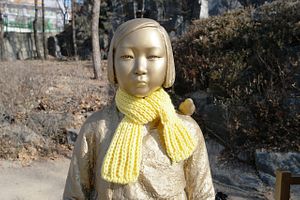Roughly one year and one week ago, the governments of Japan and South Korea came to an agreement over the issue of Japan’s wartime sexual slavery of Korean women — known euphemistically as the “comfort women.” Per the agreement, Japan apologized and agree to contribute 1 billion yen (approximately $8.3 million at the time) to set up a foundation under the South Korean government to support the living victims.
Though the governments of now-impeached South Korean President Park Geun-hye and Japanese Prime Minister Shinzo Abe thought the deal sufficient at the time to move the 50-year-old bilateral relationship past this decades-old dispute, public opinion was another matter. In Japan, conservatives on Abe’s right condemned the agreement as unnecessary given previous Japanese expressions of remorse and, more significantly, in South Korea, critics in the media and civil society described the deal as Park effectively selling out the dignity of survivors of wartime sexual slavery for short-term diplomatic and geopolitical gain. (A rising North Korean threat and mutual concerns over China were factors that led to the agreement becoming opportune in the first place.)
This week showed that the premature conclusion of an agreement on the issue without public support, especially in South Korea, may doom the 2015 “comfort women” deal to unravel. On Friday, Tokyo recalled its ambassador to South Korea, Yasumasa Nagamine, in protest of a statue commemorating the “comfort women” outside the Japanese Consulate in Busan. Yasuhiro Morimoto, the consul general in Busan, was also recalled “temporarily,” according to a spokesperson for Japan’s Ministry of Foreign Affairs. Japan had recalled its envoy to South Korea in 2012 when then-South Korean President Lee Myung-bak visited the disputed Dokdo/Takeshima islets in the Sea of Japan.
Though the Busan statue is new, an earlier statue was placed by activists outside the Japanese embassy in Seoul and was part of the 2015 deal’s quid pro quo from the South Korean side. In exchange for Japan’s new apology and 1 billion yen contribution, South Korea was not only meant to set aside the issue as a diplomatic wedge between the two countries, but also remove the Seoul statue. According to the Korea Herald, in addition to the Busan and Seoul statues, which are notable for their proximity to Japanese diplomatic missions, 37 similar commemorative statues exist around the country.
While time will tell how South Korea will react to the strong signal sent by Japan by recalling its ambassador over the statue issue, Tokyo’s step underlines an early criticism of the deal: that despite assurances by both governments that it would be a “a final and irreversible resolution” to the issue, that could not be without public opinion buy-in in both countries. A poll released last month showed that a majority of South Korean continue to feel that the agreement should be scrapped, with just 25.9 percent in favor of retaining it.
The move also suggests that the Abe government is starting to come to terms with the right-wing Japanese critique of the deal that condemned South Korea for not taking swift action on the statue despite Japanese concessions. “South Korea is our neighbor and an extremely important country. So it is extremely regrettable we had to resort to such action,” Yoshihide Suga, Abe’s chief cabinet secretary, told reporters. For Japan, the fact that South Korea was unable to take adequate domestic action to remove the statue in Seoul and now has allowed another to go up in Busan represents the possibility that the deal could be annulled.
Japan’s decision to recall its ambassador appears to have been made without consideration of South Korea’s ongoing political crisis following Park Geun-hye impeachment after an influence-peddling scandal. With the country expected to head into new elections this year, the caretaker government of Acting President Hwang Kyo-ahn will have little legitimacy by which to push for a solution, either bilaterally with Japan or domestically with the activist groups in South Korea still displeased at the deal in the first place. Moreover, with political winds in South Korea blowing in favor of the opposition after Park’s scandal, prospects for cooperation with Japan over the issue look bleak. (The leader of the Minjoo Party once called the agreement an “unprecedented diplomatic catastrophe.”)
All this raises the prospect of the deal that was once described as “a final and irreversible resolution” withering away and the “comfort women” issue becoming just as salient in Japan-South Korea ties as it was before the December 28, 2015, agreement. A future bilateral agreement will be especially difficult for both governments given the difficulties in implementing the 2015 accord.
































